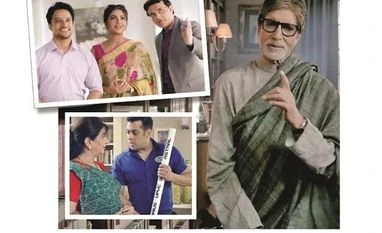Ex-cricketer Sourav Ganguly can be seen on television these days not commentating on a cricket match, but extolling the virtues of a steel bar. Surprised? That is true. The former captain of the Indian cricket team is currently the endorser of a steel brand called Captain TMT. In the ad he is telling a couple to use the right steel bars for their home if they wish to retain its strength.
Ganguly, however, is not the only celebrity pushing steel bars or allied industrial products on mass media. Big names are lending their star power to segments such as rods (Virat Kohli for Shyam Steel and Kapil Dev for SRMB Steel), pipes (Salman Khan for Astral Pipes), cables, wires & circuit breakers (Boman Irani for Havells) and cement (Amitabh Bachchan for Binani Cement) as players in these categories look to draw consumer attention.
Some of them are going a step beyond conventional advertising by sponsoring shows on TV such as Goel TMT, Indostar, Shakti TMT and Bangur Cement or tying up with sports leagues such as the Indian Premier League (Havells, SRMB, SAIL, Electrotherm Steel) and Pro Kabbadi League (RR Kabel). While some others are engaging with consumers through corporate social responsibility projects such as JK Cement (highlighting the needs of special athletes) and JSW Steel (promoting arts and culture).
The question is why are industrial products, regarded as a business to business (B2B) segment, eyeing the advertising spotlight?
The answer, say experts, lies in the overall infrastructure push of the government coupled with the growing involvement of lay people in the construction of their homes. The result is heavy brand-building on the part of players operating in the space to induce recall and aid purchase.
“What we are seeing with industrial products is similar to what happened to categories such as paints, electricals, bathroom fittings and sanitaryware a little earlier. The moment the consumer is interested to know what goes into his or her home that opens the door for organised players in the space. They want to advertise and let the consumer know the products they have to offer,” KV Sridhar, founder and chief creative officer of ad agency Hyper Collective, says.
Paints, in particular, was the first among B2B categories to transition successfully into a B2C or business to consumer segment thanks to companies realising early on that ordinary citizens were keen to know what colour was best for their homes.
Decorative paints, which are paints used in homes, buildings, shops and business establishments, today constitute 75 per cent of the nearly Rs 50,000 crore overall paint market in India. The brands here are big including names such as Asian Paints, Berger, Nerolac and Dulux, which spend big bucks on advertising and marketing. In recent years, these companies have also entered into areas such as home and painting solutions in their bid to improve consumer engagement and connect.
As N Chandramouli, chief executive officer, TRA, a brand intelligence and data insights company, says, “Like consumer goods, industrial products are making the journey from being a commodity to a product and then a brand. This is a natural progression and is led in part by a shift from unorganised to organised. Some players are not big on the national stage. With mass-media advertising, they’re able to influence a larger set of people which includes house-owners, apart from contractors, builders and workers,” he says.
Switching at the right time
For many companies in the industrial space, the need for brand-building also comes as they expand distribution on the ground, covering newer markets, dealers and distributors. As Abhisar Jain, research analyst, metals & mining, Centrum Broking, says, “Most of these companies (in steel, cement and industrial goods) have a large franchisee base for penetrating the deeper retail pockets of the country. It becomes imperative then for these companies to let their target audience know where they are and how they can be reached.”
For instance, JSW Steel through its ‘JSW Shoppe’ franchisee model is pushing reach beyond metros into smaller towns and cities. Essar Steel through its ‘Hypermart’ chain of stores is also looking to improve reach, offering corrugated sheets and TMT bars among other products.
Steel Authority of India (SAIL), a Government of India undertaking, already has a robust network of rural and urban dealers, aimed at meeting customer requirements across the country. SAIL has also entered into exclusive dealer-distributor arrangements for sale of some its products in remote and far-flung areas.
A SAIL spokesperson said the firm had set up a new vertical to deal with last-mile connectivity and help in value addition outside of its plants.
SAIL is also undertaking a branding exercise in rural areas, which involves workshops for locals. The company is also pushing its presence on social media to engage with digital natives keen to know who they are.
Unlock 30+ premium stories daily hand-picked by our editors, across devices on browser and app.
Pick your 5 favourite companies, get a daily email with all news updates on them.
Full access to our intuitive epaper - clip, save, share articles from any device; newspaper archives from 2006.
Preferential invites to Business Standard events.
Curated newsletters on markets, personal finance, policy & politics, start-ups, technology, and more.
)